Arun Sudhaman 17 Apr 2015 // 8:36AM GMT

Does an authentic purpose give companies a competitive advantage? This was, perhaps, the core question at a Burson-Marsteller event earlier this week, which served to launch the firm's latest corporate purpose study.
The report, based on interviews with business leaders, found an unsurprising tension between corporate purpose and quarterly financial goals, helping to explain why Unilever has dispensed with short-term financial reporting as it attempts to drive its sustainability agenda.
In the video interview (below) with the Holmes Report at the event, Marks & Spencer Plan A director Mike Barry explained why companies find it difficult to stick with a corporate purpose initiative, likening many plans to "fireworks that have fizzled out."
In the eight years since it was launched, Plan A has, in many respects, become a model sustainability strategy for retailers and FMCG companies. Barry notes that "selling the business case" is crucial. "You need to show a route to loot."
Barry's other tips include:
-
A long-term commitment in the face of inevitable complexity — "Too many organisations have gone off on this without being clear about the business case";
-
A focus on the customer, rather than on "tick box CSR";
-
Decentralisation to drive passion among employees;
-
Making plans locally relevant; and,
-
Reaching out to stakeholders (like Oxfam and the WWF in this case) and broader industry organisations.
"We’ve had to let 86,000 colleagues experiment and do plan A in their own way," said Barry. "That’s why the business case is so important. They have to be able to see that this will drive sales, make supply chains more resilient and excite employees. And we’ve made that case."


































.jpg)

















